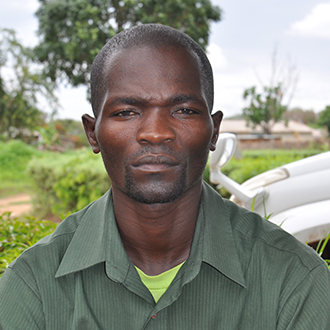
Adriano Banda, headman of Kalinde village in Katete District, Zambia, is also a community health worker and malaria volunteer
Adrian Banda, 32 years old, carries the weight of his world on his shoulders. Quiet and contemplative from afar, Adrian transforms when he speaks. His cadence is fast and determined; a current of words cascade out of his mouth in his local dialect, Chichewa and broken English. Adrian is a man who wears many hats. He is a farmer, a husband, and a father of five. He is also the headman of his village, Kalinde, in the Eastern Province of Zambia, where he serves as the community leader, mentor, and arbiter of disagreements.
Adrian also serves his community as a volunteer community health worker (CHW). With a health system hindered by a shortage of doctors and other health workers, CHWs in Zambia are essential in their communities. Many villagers live great distances from health facilities and lack transport to reach them. Frontline health workers like Adrian are often the first, and sometimes only, providers of health services essential to child and maternal survival, like diagnosing and treating malaria.
Adrian was 22 when he lost his father. He lost his mother to illness a short while later. “This is what motivated me to get involved and educated about health,” he said. “I was so proud to be chosen by my community as a health worker. Wherever I go, people praise me as a village doctor.”
Adrian cares for about 1,500 people in 11 nearby villages, assisting his neighbors and those in surrounding communities, diagnosing and treating common childhood illnesses, engaging in community health promotion, monitoring growth, and providing tuberculosis and HIV and AIDS treatment counseling and support.
He is a vital link between his village and the rural health center 5 miles away. “CHWs invest their efforts into their own communities where they know the residents,” said Miriam Bamba, nurse and head of the regional health center nearby. “In rural settings, volunteer health workers like Adrian are a lifeline between villages and the [health] post.”
Health workers like Adrian are keenly aware of the health issues affecting their communities. In Kalinde Village, malaria, respiratory infections, diarrhea, malnutrition, and anemia cause the majority of illnesses and deaths.
He attends to 15 to 20 people each day. Most people present with fever. He has been trained on how to administer a rapid finger-stick test to see if malaria parasites are present in the blood.
When he started, the community had a lot of problems because they did not know how to look for signs of malaria. “We used to have many malaria cases; many people were dying; countless others were getting sick.” He recounted that the disease affected the community in many ways; people were not able to farm or attend school and spent time nursing the sick.
“Now we are able to test and treat community members. We educate them on how to take the medicines, emphasizing on finishing the course. My major role in fighting malaria has been educating the people on how they can prevent malaria by consistent use of mosquito nets and spraying of homes. I teach people that they can get malaria all year round; hence, they must use mosquito nets all year round.”
Without a car or bicycle, Adrian spends much of his time on foot. He sometimes will borrow a bike. “If [a] patient is from far off, we walk to them, or the patient has to walk. When the sick come at night, it is difficult to see and treat them. They do not have light, they do not have candles, and they don’t have lanterns.”
His community appreciates his sacrifice. “People are very thankful,” Adrian said. “I’m motivated to work hard as a volunteer because of the trust and confidence the people showed by choosing me. I do not want to let them down.”
In Zambia, health services are free, but long distances often lead to delays in seeking services. Also, costs associated with medical care – fees paid for transportation and out-of-pocket expenditures for food and medicine – often prove prohibitive. Poor households generally spend the highest proportion of their income on health. With families having little spare cash, cost is a key impediment to health-seeking behavior.
“There are many people who would have died because of the distance to the hospital,” Adrian said. “There are many people that, because of distance, they would decide to not seek treatment or would have delayed treatment. In delaying treatment, many people would deteriorate or die. Having medicines and being able to test in the community has helped a lot.”
Adrian sees first-hand the impact of the availability of malaria prevention and treatment. Before the U.S. President’s Malaria Initiative, “There were too many deaths and too much sickness,” Adrian said. “People were unable to farm and find food. We spent a lot of time attending funerals and tending to sick people. I used to conduct about 30 malaria tests, and about 27 would be positive for malaria. These days it’s the opposite, out of 10 tests you will find maybe 1 positive for malaria. This is a good sign that malaria is on the decline.”
Betty Banda, is 3 years old and is Adrian’s only daughter. He dreams for her to become a “real (medical) doctor” and not “a village doctor” like him. He sees malaria elimination as an important endeavor because of her future and others. “It is important to end malaria in Zambia for all children because development will be enhanced, and more children will be educated,” he said with Betty on his knee. “It’s our future.”
